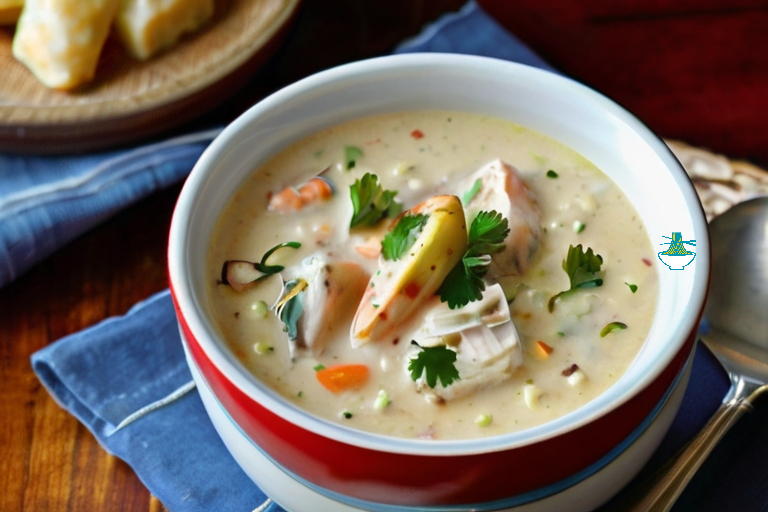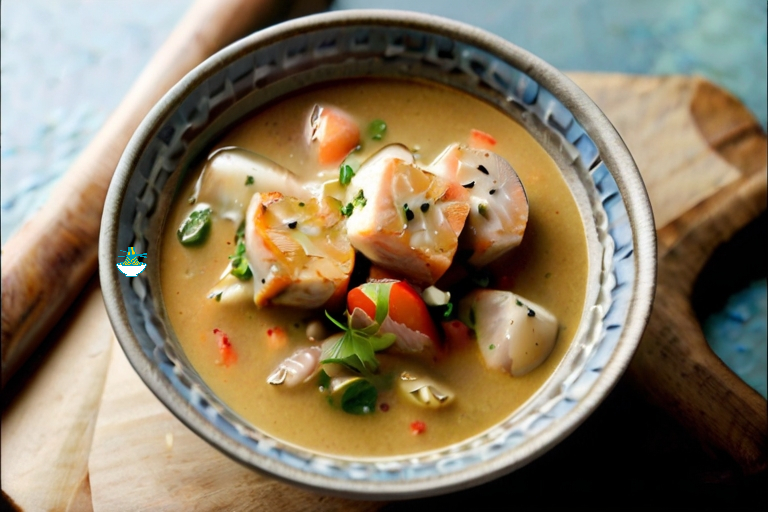Welcome to a taste of the Bahamas with this delightful Fish Chowder recipe! Bursting with flavors of the Caribbean, this dish combines fresh fish, vibrant vegetables, and a blend of spices to create a hearty and satisfying meal. Whether you're craving a comforting bowl of soup on a chilly evening or seeking a taste of tropical paradise, this Bahamas Fish Chowder is sure to transport your taste buds to sun-kissed shores. Let's dive into the recipe and capture the essence of island cuisine right in your own kitchen.
Ingredients:
- 1 lb (450g) firm white fish fillets (such as grouper, snapper, or mahi-mahi), cut into bite-sized pieces
- 1 tablespoon olive oil
- 1 onion, diced
- 2 cloves garlic, minced
- 1 bell pepper, diced (any color)
- 2 medium carrots, diced
- 2 celery stalks, diced
- 2 medium potatoes, diced
- 1 cup diced tomatoes (fresh or canned)
- 4 cups fish or vegetable broth
- 1 cup coconut milk
- 1 teaspoon dried thyme
- 1 teaspoon paprika
- 1 bay leaf
- Salt and pepper to taste
- 2 tablespoons chopped fresh parsley, for garnish
- Lime wedges, for serving

Instructions:
1- Heat olive oil in a large pot over medium heat. Add diced onion and minced garlic, sautéing until softened and fragrant, about 2-3 minutes.
2- Add diced bell pepper, carrots, and celery to the pot. Cook, stirring occasionally, for another 5 minutes until the vegetables begin to soften.
3- Stir in diced potatoes, diced tomatoes, dried thyme, paprika, and bay leaf. Cook for another 2 minutes to allow the flavors to meld.
4- Pour in the fish or vegetable broth and bring the mixture to a gentle simmer. Let it cook for about 15 minutes or until the potatoes are tender.
5- Once the potatoes are cooked, add the bite-sized fish pieces to the pot along with the coconut milk. Simmer gently for another 5-7 minutes, or until the fish is cooked through and flakes easily with a fork.
6- Season the chowder with salt and pepper to taste. Adjust the seasoning if necessary.
7- Remove the bay leaf from the chowder and discard.
8- Ladle the Bahamas Fish Chowder into serving bowls. Garnish with chopped fresh parsley and serve hot with lime wedges on the side for squeezing over the soup.
9- Enjoy your hearty bowl of Bahamas Fish Chowder, filled with the flavors of the Caribbean!
Nutritional Values
Here's an approximate breakdown of the nutritional values for the listed ingredients per serving, assuming the recipe yields 4 servings:
Fish Fillets (1 lb / 450g):
- Calories: 160
- Protein: 34g
- Fat: 1g
- Carbohydrates: 0g
- Fiber: 0g
benefits: Excellent source of protein, omega-3 fatty acids, and various vitamins and minerals such as vitamin D and selenium, which support heart health, brain function, and overall well-being.
Olive Oil (1 tablespoon):
- Calories: 120
- Fat: 14g
- No significant protein, carbohydrate, or fiber
benefits: Rich in monounsaturated fats and antioxidants, olive oil promotes heart health, reduces inflammation, and may lower the risk of chronic diseases like heart disease and certain cancers.
Onion (1 medium):
- Calories: 44
- Protein: 1g
- Fat: 0g
- Carbohydrates: 10g
- Fiber: 2g
benefits: Contains antioxidants and compounds that may help reduce inflammation, improve heart health, and support immune function.
Garlic (2 cloves):
- Calories: 10
- Protein: 0g
- Fat: 0g
- Carbohydrates: 2g
- Fiber: 0g
benefits: Known for its antibacterial and antiviral properties, garlic also helps lower cholesterol, regulate blood pressure, and boost immune function.
Bell Pepper (1 medium):
- Calories: 25
- Protein: 1g
- Fat: 0g
- Carbohydrates: 6g
- Fiber: 2g
benefits: Packed with vitamin C, antioxidants, and fiber, bell peppers support immune health, eye health, and digestion.
Carrots (2 medium):
- Calories: 50
- Protein: 1g
- Fat: 0g
- Carbohydrates: 12g
- Fiber: 4g
benefits: High in beta-carotene, fiber, and antioxidants, carrots promote eye health, improve digestion, and may reduce the risk of chronic diseases.
Celery Stalks (2 medium):
- Calories: 10
- Protein: 0g
- Fat: 0g
- Carbohydrates: 2g
- Fiber: 2g
benefits: Low in calories and rich in fiber, vitamins, and minerals, celery supports digestion, hydration, and may help lower inflammation.
Potatoes (2 medium):
- Calories: 220
- Protein: 5g
- Fat: 0g
- Carbohydrates: 50g
- Fiber: 6g
benefits: Good source of carbohydrates, potassium, and vitamin C, potatoes provide energy, support muscle function, and aid in immune health.
Diced Tomatoes (1 cup):
- Calories: 30
- Protein: 1g
- Fat: 0g
- Carbohydrates: 7g
- Fiber: 2g
benefits: Rich in antioxidants like lycopene and vitamins A and C, tomatoes support heart health, skin health, and may reduce the risk of certain cancers.
Fish or Vegetable Broth (4 cups):
- Calories: 20
- Protein: 1g
- Fat: 0g
- Carbohydrates: 4g
- Fiber: 0g
benefits: Provides hydration and may contain essential nutrients like protein, vitamins, and minerals, depending on the ingredients used.
Coconut Milk (1 cup):
- Calories: 445
- Protein: 5g
- Fat: 48g
- Carbohydrates: 6g
- Fiber: 0g
benefits: Contains healthy fats and nutrients like manganese, copper, and magnesium, coconut milk supports heart health, metabolism, and immune function.
Dried Thyme (1 teaspoon):
- Negligible calories, protein, fat, carbohydrates, or fiber
benefits: Contains antioxidants and compounds that may have anti-inflammatory and antimicrobial properties, supporting overall health.
Paprika (1 teaspoon):
- Negligible calories, protein, fat, carbohydrates, or fiber
benefits: Rich in antioxidants like capsaicin, paprika may aid digestion, improve circulation, and support eye health.
Bay Leaf (1 leaf):
- Negligible calories, protein, fat, carbohydrates, or fiber
benefits: Contains vitamins, minerals, and essential oils with potential health benefits, including improved digestion and reduced inflammation.
Salt and Pepper (to taste):
- Negligible calories, protein, fat, carbohydrates, or fiber
benefits: Used in moderation, salt provides essential electrolytes, while pepper contains antioxidants and may aid digestion.
Fresh Parsley (2 tablespoons):
- Calories: 2
- Protein: 0g
- Fat: 0g
- Carbohydrates: 0g
- Fiber: 0g
benefits: Rich in vitamins A, C, and K, as well as antioxidants, parsley supports bone health, immune function, and may have anti-inflammatory effects.
Lime Wedges (for serving):
- Negligible calories, protein, fat, carbohydrates, or fiber
benefits: High in vitamin C and antioxidants, limes support immune health, digestion, and skin health.
Please note that these values are approximate and can vary based on factors such as specific brands of ingredients and preparation methods.


Comments